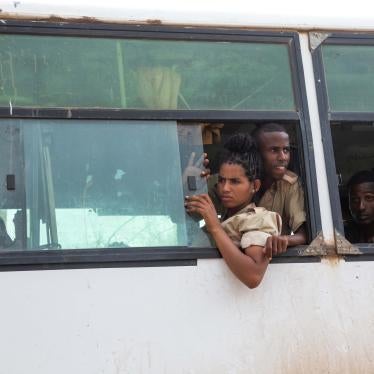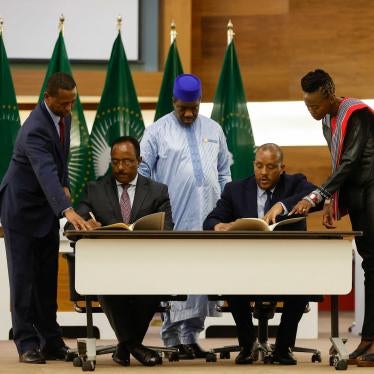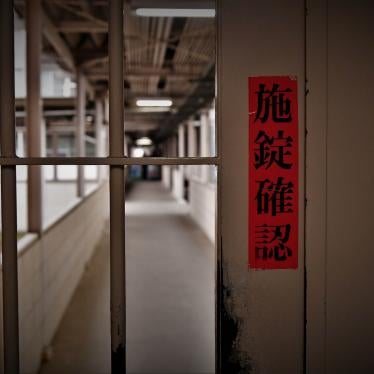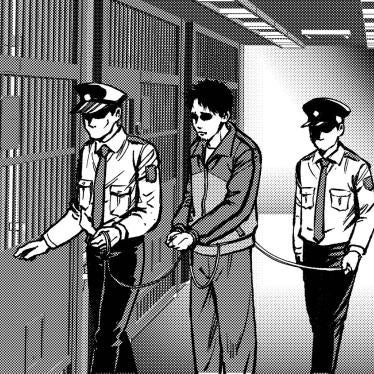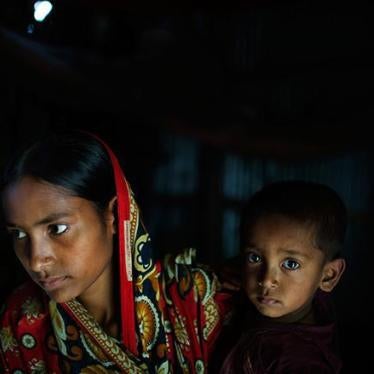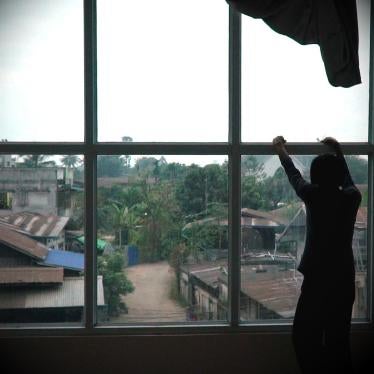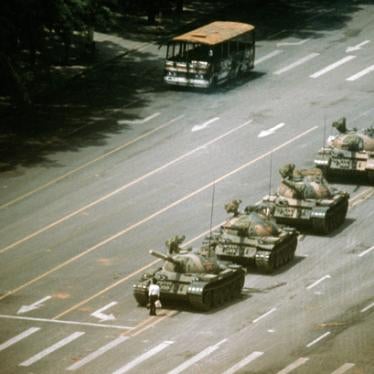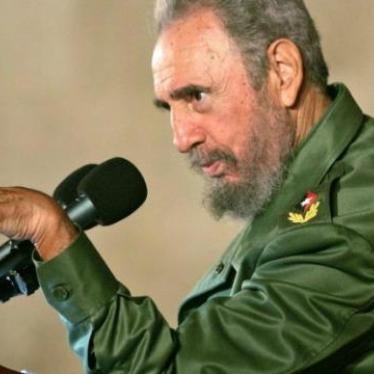(アブジャ)— イスラム過激派ボコ・ハラムによる攻撃で、今年に入ってから1,000人超の一般市民が犠牲になったと、目撃者証言や報道分析をもとにヒューマン・ライツ・ウォッチは本日述べた。ボコ・ハラム戦闘員は意図的に村落を襲撃して、大量殺人や拉致を行っており、2月以来、被害はナイジェリア北東部からカメルーンやチャド、ニジェールにまで拡大している。
ヒューマン・ライツ・ウォッチは1月下旬、北東部のヨベ、アダマワ、ボルノ各州から避難してきた人びとに聞き取り取材を行い、残忍きわまりない恐怖の実態を明らかにした。2014年半ばからボコ・ハラムは、ナイジェリア北東部3州17の自治体にある数々の町や村落を支配下に置いてきた。今年3月に入ってからは、ナイジェリア軍とチャド軍がその一部を奪還している。
ヒューマン・ライツ・ウォッチのナイジェリア担当調査員マウシ・セグンは、「くる週もくる週も、ボコ・ハラムの人権侵害は凶悪さを増している」と述べる。「ナイジェリア政府は、ボコ・ハラムに対する軍事作戦の優先課題に、一般市民の保護をすえるべきだ。」
調査結果から、ナイジェリア政府軍およびカメルーン、チャド、ニジェール軍と、ボコ・ハラム間の紛争における人的被害の大きさが浮き彫りになった。ナイジェリアのNational Emergency Management Agencyによると、2009年7月にこのイスラム過激派の反体制派勢力の武装蜂起以降、100万人近くが避難を余儀なくされている。ヒューマン・ライツ・ウォッチは、ボコ・ハラムによる攻撃の犠牲となった一般市民の数は、2014年中に少なくとも3,750人にのぼると推定している。2015年の1-3月の間の攻撃の数は、2014年同時期に比べて増加しており、女性や子どもが利用されたと見られる自爆テロ7件もある。
またボコ・ハラムは、何百人もの成人女性や少女を拉致。多くが強制改宗や強制結婚、レイプなどの人権侵害を受けた。成人男性や少年がボコ・ハラムへの参加を強制されるか、さもなければ死に直面したことも、ヒューマン・ライツ・ウォッチの調査は明らかにしている。数十万人規模の人びとが家を離れたが、これはボコ・ハラム戦闘員にそう命じられたか、身の危険を感じてのことだった。
避難した人びとは口々に、ボコ・ハラムによる殺人や、自宅およびコミュニティ焼き討ちを目撃したのち、脱出した際に持ち出せたのは衣類のみだったと証言する。こうした被害をナイジェリア治安部隊によって受けたケースも1件あった。
「ボコ・ハラムが投げつけてきた爆弾が丘にいた私たちの周りで爆発し始めた時、人間の体がバラバラになって、あちこちに飛び散るのをみました」と、ボルノ州グオザの丘で遭遇した攻撃について、1月下旬にある住民が証言した。「飢餓と乾きですでに弱っていた人びとは、爆発による煙で何度もむせて、気絶してしまいました[中略]。私はあの夜脱出しました。」
避難民たちはまた、ボコ・ハラムが学校を狙って焼き討ちにしていた様を詳述。一部の学校は政府軍に接収されていた。軍事利用されていない学校などの民間施設(民用物)に対する意図的な攻撃は、戦争犯罪に該当する。ボコ・ハラムによる学校襲撃、村落への攻撃の結果余儀なくされる避難、ナイジェリア軍による学校の軍事利用は学校に損害を与えるだけではない。北東部に住む何千人もの子供たちが教育機会を奪われている。
ヒューマン・ライツ・ウォッチの調査で、ナイジェリア政府治安部隊がボコ・ハラムに対する軍事作戦を展開した際に、一般市民を保護するために実行可能なすべての措置をとる責任を果たさなかったことも明らかになった。
たとえば昨年12月に、ナイジェリア政府治安部隊がバウチ州にあるボコ・ハラムの拠点に近い村落ムンドゥを襲撃し、焼き払った。この攻撃に関する複数の目撃証言によると、一般市民5人が死亡し、70世帯が家を失ったという。村の住人たちはヒューマン・ライツ・ウォッチに、攻撃時にボコ・ハラムは村にいなかったと話した。
「兵士は英語らしき言葉で叫んでいましたが、私たちのほとんどは理解できませんでした」と村の指導者はいう。「兵士が発砲して、家や建物に放火し始めてから、みな逃げ出し始めたのです。2日後に戻ってみると、5人の遺体がありました。」犠牲者は、自宅で焼殺された80歳の盲目の男性や、精神障がいをもつホームレスの女性、結婚式に出席するために村を訪れていた2人、そして20歳の男性で、全員に銃痕があった。
首都アブジャの陸軍当局は、ヒューマン・ライツ・ウォッチが3月11日に調査結果を提示した際に、当該事件については知らないが、申立てについて軍事警察に捜査命令を出したと述べた。
メディアの報道によると、昨年9月〜今年3月の間に、ナイジェリア軍当局が北部での軍事作戦に参加した307人の兵士を「臆病」・反逆ほかの軍事犯罪で訴追し、うち70人に死刑判決が下されたという。これに対しヒューマン・ライツ・ウォッチは、その残忍性ゆえにいかなる状況下での死刑にも反対する立場をとる。一方で、北東部における一般市民に対する人権侵害ゆえに訴追された軍関係者はいない。
前出のセグン調査員は、「北東部の一般市民は、ボコ・ハラムによる攻撃からの保護を必死の思いで求めている。そんな人びとが、守ってくれるはずの政府軍兵士から標的にされるようなことがあってはならない」と指摘する。「しかるにムンドゥでの人権侵害疑惑について捜査を行うという軍の決断は、アカウンタビリティ(真相究明・責任追及)の確保と被害者への賠償にむけた、重要な第1歩といえる。」
アフリカ連合(AU)は今年1月、ナイジェリア、チャド、カメルーン、ニジェール軍からなる対ボコ・ハラム多国籍部隊の投入を正式承認。派遣決定はカメルーン、ニジェール、チャドに越境する武装勢力が増加したことを受けたため。この決定前に、ナイジェリア北東部にある無数の村落や町が攻撃されていた。
アフリカ連合は、国連安保理決議がこの多国籍部隊を正式承認する方向を模索している。カメルーン、チャド、ニジェール軍の支援を受けたナイジェリア治安部隊は3月初旬以来、北東部の一部地域からボコ・ハラムを掃討した。
国際刑事裁判所(ICC)の検察官がナイジェリアの事態を現在予備審査中だ。予備審査の結果、ICCによる捜査が開始されることも、されないこともある。ICC検察官は2015年2月2日、ICCの管轄権内でナイジェリアにおける暴力行為を扇動または実行した個人は、ナイジェリア国内法廷またはICCによる訴追の対象となる旨を警告した。ICCは、国内法廷が国際法に違反する重大犯罪を捜査・訴追できない、またはその意思がない場合にのみ介入する最終措置である。
ナイジェリア政府当局は、ムンドゥで12月6日に起きた事件をしっかり捜査し、人権侵害および戦争犯罪に関与した指揮官など、あらゆる軍関係者の責任をしっかり問うべきだ。また、ボコ・ハラムによる戦争犯罪を適切に捜査し、加害者を公正な裁判で裁かなければならない。
前出のセグン調査員は、「軍事行動は強化されたものの、ナイジェリア北東部の一般市民が置かれている悲惨な状況を、これまで少しも改善できていない」と指摘する。「一般市民を保護するとともに軍による人権侵害の責任を問うために、一層の努力をしなければ、事態は今後も悪くなるばかりだ。」
背景
In late January, Human Rights Watch interviewed 26 internally displaced persons (IDPs) aged between 14 to 58, and 13 others including journalists, aid workers, and government officials in Bauchi, Jos, and Karu, in northeastern and north central Nigeria.
According to a March 2015 report by the International Organization for Migration, more than 92 percent of people displaced by the conflict are staying with family members or other host families in communities where they have little access to humanitarian support, stretching the already limited capabilities of host families. Representatives of international non-governmental agencies told Human Rights Watch that lack of access to internally displaced people and inadequate funds hamper their efforts to provide relief and protection to those groups.
Specific incidents and patterns of abuse are described below.
Nigerian Army Attack in Mundu, Bauchi State
On December 6, 2015, Nigerian army soldiers attacked the village of Mundu, in Bauchi State, leaving at least five civilians dead and burning down most of the village, according to witnesses interviewed separately by Human Rights Watch. Six months earlier, the village leader had told the army that “strange people” whom he believed were members of Boko Haram had set up a camp in the forest 2 kilometers away. Soldiers visited the village in June and August asking for details of the camp’s location, which residents could not provide since they were afraid to go into the forest.
Mundu residents interviewed by Human Rights Watch said the village did not have Boko Haram members and that Boko Haram did not have fighters stationed there including at the time of the attack. The witnesses said that on occasion Boko Haram members came to the village market to buy food and other supplies, warned residents not to report their presence to the security forces and then returned to the nearby forest.
As the attack began, a low-flying helicopter hovered over the village, another village community leader said. Then hundreds of soldiers in 7 armored personnel carriers and 30 military trucks entered the village, and the soldiers opened fire, he said.
Satellite imagery recorded on December 14 and 24 and analyzed by Human Rights Watch provides compelling evidence of extensive fire burn scars across the village, and shows that at least 490 out of 550 structures were most likely destroyed by fire. The distinctive burn scar pattern surrounding village housing, separated by healthy vegetation and unaffected topsoil, is consistent with an arson attack, Human Rights Watch said.
When presented with the findings in a meeting on March 11 in Abuja, army authorities said they were unaware of the incident. The leader of the team of military investigators said that the chief of army staff, Lt. Gen. Kenneth Minimah, had ordered “the immediate deployment of the military police to investigate the allegations.”
Deliberate attacks on civilians and property, as well as attacks that do not discriminate between civilians and combatants are prohibited under international humanitarian law, which is binding on all parties to the conflict. Summary executions violate both the laws of war and international human rights law.
Boko Haram Attacks in Gwoza Area, Borno State
On August 6, 2014, Boko Haram fighters attacked and seized control of the Gwoza local government area, in Borno State. Witnesses told Human Rights Watch that many of the male residents of the town and surrounding villages fled to the Gwoza hills where, from a rocky lookout, they watched as the insurgents mounted their black flag over the local government headquarters, corralled 300 hundred of the town’s women and children into vehicles and drove them toward Sambisa Forest, where Boko Haram has a camp.
The insurgents also rounded up hundreds of men and boys over age 10. Those who refused to join Boko Haram were shot or slaughtered with machetes, witnesses said.
One 45-year-old man said: “I saw two of my nephews ages 13 and 18 slump down and die as the insurgents rained blows on them with guns and machetes.”
After five months during which other residents remained trapped on the hills, hiding in caves and weakened by hunger, Boko Haram attacked the civilians there, killing many and forcing others to escape over the border into Cameroon.
A 55-year-old man from Gwoza with a physical disability from childhood polio said he and his family fled to the hills after the August 6 attack fearing he would be killed because he wouldn’t be useful to the Boko Haram forces who he referred to as “insurgents”:
For about a week after we fled, we would sneak back home to eat meals prepared by women left in the town. By the second week, seven out of nine young men who sneaked into the town to eat were shot and killed by insurgents, who had now fully taken control of the town. For another seven weeks we survived on what little food young children could sneak to us up on the hill. Hunger was a constant problem. Women, including my stepmother and sister-in-law who tried to help us were abducted and taken away by the insurgents.
By August the insurgents began to come up the hills to kill many people so we left for Cameroon with about 70 others until transporters paid by the Borno State government brought us back to Yola. It was from there that I found my way to Jos.
Boko Haram Attack in Michika, Adamawa State
In Michika, a commercial town near the Cameroon border in northern Adamawa State, at least 30 people were killed, news media reported, when Boko Haram sacked the town in September 2104.
A 46-year-old woman who witnessed the Michika attack told Human Rights Watch that Boko Haram fighters killed many of the men, sparing only the people with disabilities and the elderly and took away young women and girls to a nearby forest. “When I went back home the following day, there was no trace of my missing husband and four children,” the woman said. “Muslim leaders helped to bury the bodies of 10 of my relatives.”
A 35-year-old Christian woman from Michika, Adamawa State, said on the day of the attack, a Sunday, she was attending a church service when a Muslim neighbor who was a member of a local defense group rode up on a motorcycle and warned everyone to leave because the town was being attacked:
He advised us not to run to a nearby wooded area because the insurgents had laid an ambush. We began to hear the gunshots and panic ensued. My husband insisted that I should run with our three children while he hurried home to get food and money. We later met up in another village, and then trekked from place to place for over one month before we got a commercial bus to Yola. We left Yola for Jos after Mubi fell because of the fear of an imminent attack on Yola.
My father and father-in-law were too old to run with us so both were left behind in Michika. I later heard that from neighbors who escaped that my father was killed by Boko Haram when he fled to Kwapala. We still do not know the whereabouts of my 85-year-old father-in-law.
Boko Haram Attack in Yelwa, Bauchi State
Residents of Yelwa, in the Darazo local government area, fled in July 2014 after over 100 armed men surrounded the mosque where male villagers were praying during the holy month of Ramadan, according to witnesses interviewed by Human Rights Watch. The men informed the worshippers that they were Boko Haram and that for the next nine months their group would occupy the nearby wooded area called Kukabiu. A 29-year-old woman from Yelwa said that when the armed men arrived in early June, they warned villagers not to allow their children to go to school:
They warned us that no one should teach, but because I am educated with a diploma in legal studies I want my children to also go to school. The strangers came back repeatedly to beat and harass our vigilante men [who were trying to protect the village]. Then one day, they burned down all the schools in our community. When dozens of soldiers and vigilantes failed twice to push the insurgents out of the nearby Kukabiu forest, we knew we were no longer safe. Everyone in the village fled out of fear that the insurgents would retaliate against us for reporting them to the military. I and thirteen members of my family are now squatting in this one room. I have qualifications to work but there are no jobs for us here.
Forced Recruitment by Boko Haram
A 30-year-old woman from Potiskum in Yobe State, told Human Rights Watch she and her family of eight were forced to flee to Bauchi in July 2014 because Boko Haram was killing people in the area, forcibly recruiting young men and kidnapping women:
We left Potiskum in July 2014 when we realized that there was no protection from Boko Haram. When they attack, everyone will run away, including soldiers and vigilante members. Those who did not run were forced to join the group. The new recruits would later return to take their wives and children by force to the Boko Haram camp and they were never seen again. I became afraid because my daughter was engaged to be married to a young man. What if he joined Boko Haram and takes her with him? So we fled with her to Bauchi. We don’t know what has become of her fiancé.
A 24-year-old man from the village of Damaturu in Yobe State said:
I began to notice changes in some of my friends who I grew up with in Damaturu. Initially we heard preaching about jihad, but those doing it hid the fact that they had joined Boko Haram. They targeted men and boys between 16 and 30. I panicked when I saw that my friends who yielded to the pressure would not only move to the insurgents’ nearby camp, but also take their wives and children with them.
I became confused and afraid but I did not want to join because of the bad things they were doing. I don’t think they truly fear God. The new recruits were forced to extort, steal, kidnap, and rape women and girls. When they threatened to kill me if I did not accept to join, my mother got some money to transport me and three of my younger brothers who were also being pressured by the insurgents. We left Damaturu to stay with our uncle in another state that night and have not returned home.
A 14-year-old boy from Yelwa, Bauchi State, described what happened when Boko Haram came to his village in June 2014:
I was afraid when Boko Haram came to the mosque in my village to preach during the fasting period. There were children around my age and younger with them carrying guns. The young fighters joined them to burn down the primary school where I was a student. When they began to harass our village emir to volunteer 10 young men to join their group, we all abandoned the village. No one stayed back, not even the emir. We are scattered in different places but most of us are in Bauchi. I want to return to school, but have not had the opportunity.
Attacks on Schools by Boko Haram
Boko Haram, whose name means “Western education is forbidden,” has attacked schools and abducted students and teachers from schools since early 2012.
Displaced people told Human Rights Watch that they had seen child fighters during Boko Haram attacks on their communities in Borno State, and that Boko Haram had burned school buildings. As a result of the attacks on schools and the killing of students and teachers, Borno State authorities had closed down schools in March 2014 without providing alternatives. The army later used a number of schools that were still standing as military bases, resulting in further attacks on the schools by Boko Haram.
Many displaced people expressed concern that their children were unable to go to school in camps for displaced people and host communities. The attacks on schools and the limited educational opportunities for displaced children have further impeded access to education for already disadvantaged school-age children in the northeast. According to the most recent National Education Data Survey, in 2010 children in northeast already made up more than 60 percent of Nigeria’s estimated 10.5 million children who are not in school.
A 36-year-old teacher who fled the village of Waga Mongoro village, near Madagali, Adamawa State, said Boko Haram attacked his village on May 12, 2014, and burned down the school where he taught:
They came from the direction of Limankara, Borno State, where they killed many people, and kidnapped the pregnant wife and two children of my friend, a pastor. Once we heard that the insurgents had blown up the bridge linking Adawama with Borno State, the men of Waga fled to the hills. We only returned during the day to work and to eat. When in August Boko Haram attacked Limankara again, sacking the Mobile Police training academy, fear began to rule our lives.
The military tried to stop the insurgents from coming into Adamawa State but we were shocked to see them driving back with full speed on the armored personnel carriers two days later, shooting in the air. We took this as signal to escape and fled to a primary school in Tur, near the Nigeria/Cameroon border. Again Boko Haram fighters attacked Tur and burned down the school so we fled to Ville.
Unfortunately, the insurgents seemed to be on our trail as they struck Ville, burning down schools and other buildings. My family scattered in different directions…. In early January 2015, my wife and other three children who were stuck elsewhere were able to join me in Jos. We have been here for about one month now and my children are missing out on their education. I am concerned as a father and a teacher that I am unable to help them. I can only hope that their future would not be wasted.
Nigerian Military Use of Schools
Nine witnesses interviewed by Human Rights Watch said that soldiers took over closed schools in the Borno communities of Chinene, Ngoshe, Ashigashiya, Wuje, Pulka, and Gwoza, among others.
In some locations, including Gwoza, the use of school buildings as military bases appears to have led to Boko Haram attacks on the schools.
A 42-year-old man displaced from Khalawa village in Gwoza, Borno State, said:
Soldiers were using the primary school in Chinene, Wuje primary school at Pulka junction for about three months, and the government secondary school in Ngoshe, all in Gwoza, as military bases. They were stationed in Chinene for close to two months, from April to June 2014. I saw soldiers taking five men they arrested from Barawa and Dogode for being members of Boko Haram into Chinene primary school. They detained them there for some days before taking them away in a military vehicle.
The soldiers were later forced to evacuate the schools and the entire area when Nigeria Air Force jets were dropping bombs over the area. Many buildings including schools were destroyed during the air raids. Boko Haram fighters burned down the schools in Chinene and Ngoshe when they took over the towns in June.
Under international humanitarian law, schools are generally protected from attack as civilian objects. But the presence of troops and weapons in a school can make a school a valid target for attack. Even in schools that are not attacked, military use can damage or destroy school infrastructure and education materials can be lost.
The United Nations Security Council’s adopted Resolution 2143 (2014) encouraged all UN member states “to consider concrete measures to deter the use of schools by armed forces and armed non-State groups in contravention of applicable international law.” Children have the right to education under the International Covenant on Economic, Social and Cultural Rights to which Nigeria is party.
Guidelines for Protecting Schools and Universities from Military Use during Armed Conflict offer guidance to parties to conflicts on how to avoid the military use of educational facilities for military purposes and to mitigate the impact the practice can have on students’ safety and education.
The Nigerian government should incorporate the provisions of the guidelines into domestic legislation, or into its military doctrine and policy, to help protect students in armed conflict. The Nigerian government should also take concerted steps to improve access to education for children in Nigeria, including for children displaced by conflict in the northeast.
